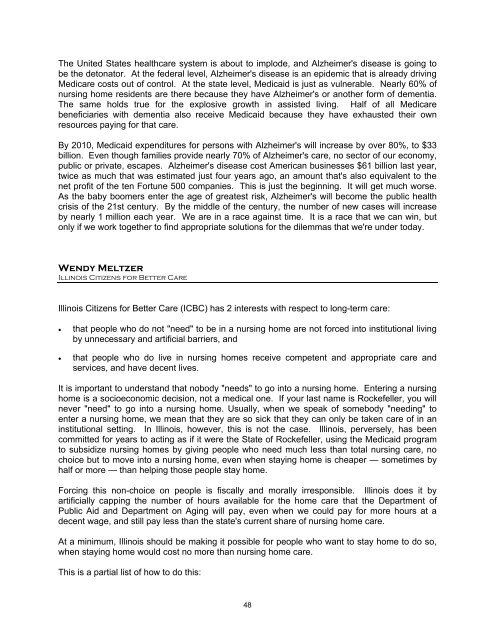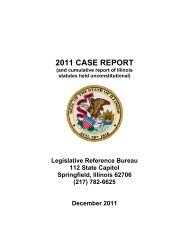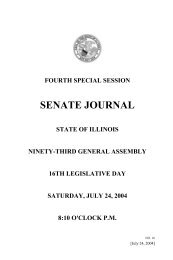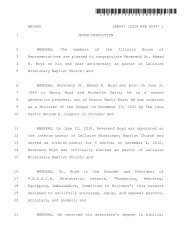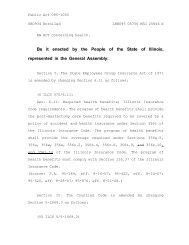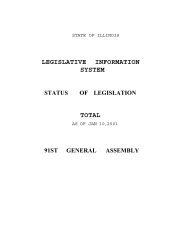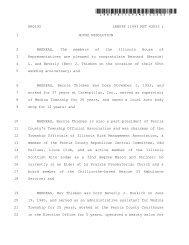Long-Term Care - Illinois General Assembly
Long-Term Care - Illinois General Assembly
Long-Term Care - Illinois General Assembly
You also want an ePaper? Increase the reach of your titles
YUMPU automatically turns print PDFs into web optimized ePapers that Google loves.
The United States healthcare system is about to implode, and Alzheimer's disease is going to<br />
be the detonator. At the federal level, Alzheimer's disease is an epidemic that is already driving<br />
Medicare costs out of control. At the state level, Medicaid is just as vulnerable. Nearly 60% of<br />
nursing home residents are there because they have Alzheimer's or another form of dementia.<br />
The same holds true for the explosive growth in assisted living. Half of all Medicare<br />
beneficiaries with dementia also receive Medicaid because they have exhausted their own<br />
resources paying for that care.<br />
By 2010, Medicaid expenditures for persons with Alzheimer's will increase by over 80%, to $33<br />
billion. Even though families provide nearly 70% of Alzheimer's care, no sector of our economy,<br />
public or private, escapes. Alzheimer's disease cost American businesses $61 billion last year,<br />
twice as much that was estimated just four years ago, an amount that's also equivalent to the<br />
net profit of the ten Fortune 500 companies. This is just the beginning. It will get much worse.<br />
As the baby boomers enter the age of greatest risk, Alzheimer's will become the public health<br />
crisis of the 21st century. By the middle of the century, the number of new cases will increase<br />
by nearly 1 million each year. We are in a race against time. It is a race that we can win, but<br />
only if we work together to find appropriate solutions for the dilemmas that we're under today.<br />
Wendy Meltzer<br />
<strong>Illinois</strong> Citizens for Better <strong>Care</strong><br />
<strong>Illinois</strong> Citizens for Better <strong>Care</strong> (ICBC) has 2 interests with respect to long-term care:<br />
• that people who do not "need" to be in a nursing home are not forced into institutional living<br />
by unnecessary and artificial barriers, and<br />
• that people who do live in nursing homes receive competent and appropriate care and<br />
services, and have decent lives.<br />
It is important to understand that nobody "needs" to go into a nursing home. Entering a nursing<br />
home is a socioeconomic decision, not a medical one. If your last name is Rockefeller, you will<br />
never "need" to go into a nursing home. Usually, when we speak of somebody "needing" to<br />
enter a nursing home, we mean that they are so sick that they can only be taken care of in an<br />
institutional setting. In <strong>Illinois</strong>, however, this is not the case. <strong>Illinois</strong>, perversely, has been<br />
committed for years to acting as if it were the State of Rockefeller, using the Medicaid program<br />
to subsidize nursing homes by giving people who need much less than total nursing care, no<br />
choice but to move into a nursing home, even when staying home is cheaper — sometimes by<br />
half or more — than helping those people stay home.<br />
Forcing this non-choice on people is fiscally and morally irresponsible. <strong>Illinois</strong> does it by<br />
artificially capping the number of hours available for the home care that the Department of<br />
Public Aid and Department on Aging will pay, even when we could pay for more hours at a<br />
decent wage, and still pay less than the state's current share of nursing home care.<br />
At a minimum, <strong>Illinois</strong> should be making it possible for people who want to stay home to do so,<br />
when staying home would cost no more than nursing home care.<br />
This is a partial list of how to do this:<br />
48


